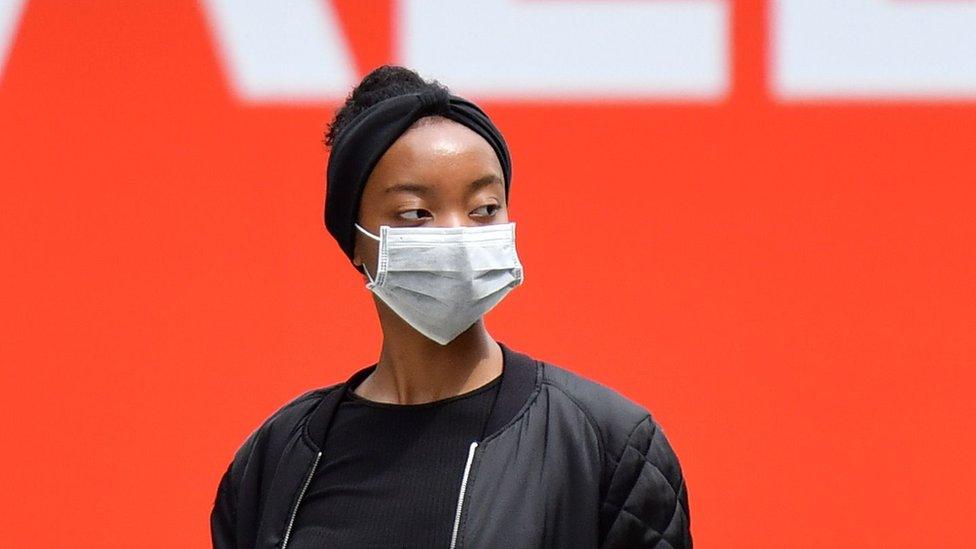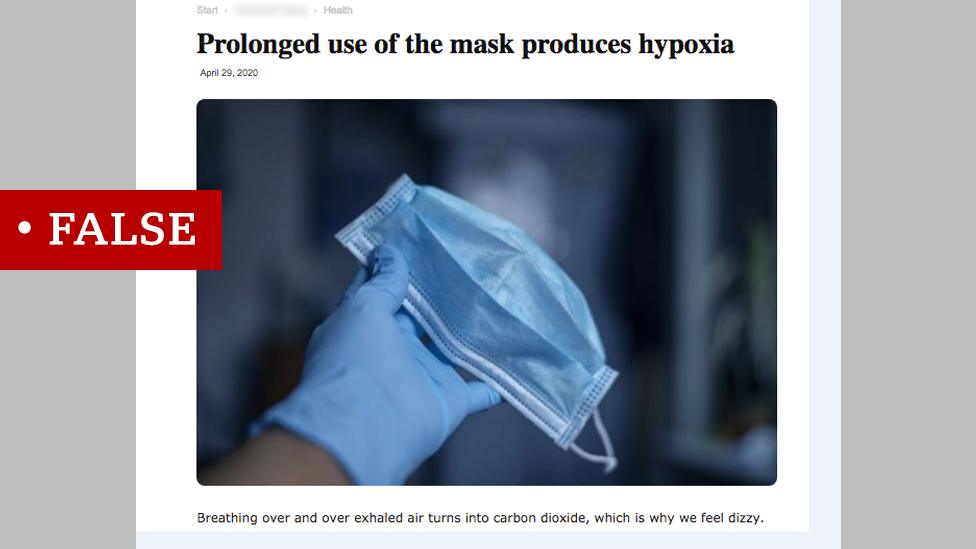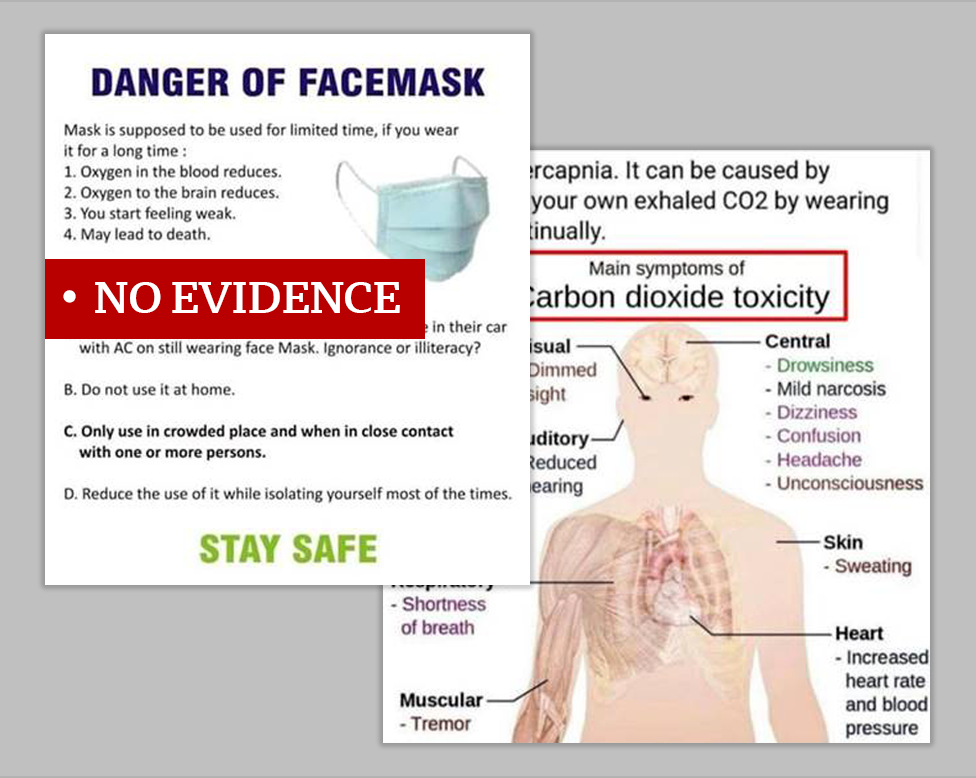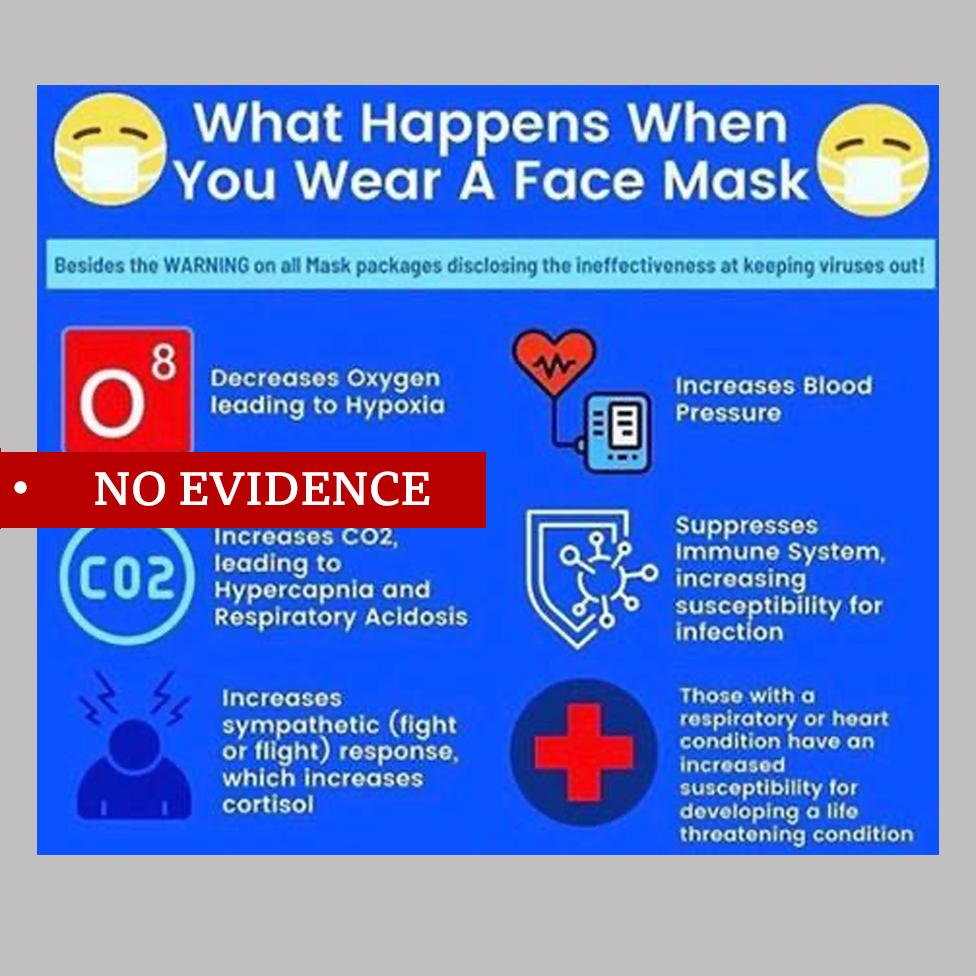Coronavirus: 'Deadly masks' claims debunked
- Published

Face coverings are now compulsory for customers in shops and supermarkets in England.
The mandatory wearing of coverings and masks has been polarising opinion for weeks, particularly in the United States.
The BBC's anti-disinformation team has been investigating false and misleading claims about the health risks of face masks and coverings being shared on social media.
Claim: Masks deprive your body of oxygen
Verdict: False claim
One of the most common themes in misleading posts surrounding the use of masks is that they limit the amount of oxygen getting into the body.
People have shared a graphic titled "danger of a face mask" and say this "may lead to death".

But the breathable materials recommended for face masks worn properly won't inhibit your breathing.
Breathlessness is a sign that your body is deprived of oxygen - known as hypoxia.
"Thin paper or cloth masks will not lead to hypoxia. Surgeons operate for hours wearing them. They don't get these problems," says Prof Keith Neal, an infectious disease expert.
The WHO says: "The prolonged use of medical masks when properly worn, does not cause CO2 intoxication nor oxygen deficiency.
"While wearing a medical mask, make sure it fits properly and that it is tight enough to allow you to breathe normally. Do not re-use a disposable mask and always change it as soon as it gets damp."
These oxygen-depleting claims have appeared in many different languages: English, German, Serbian and Hebrew Facebook posts alongside the same stock image of a toddler in a mask.
An article on a Nigerian news site, originally translated from Spanish, carried the claim back in April and has been shared 100,000 times.
Claim: Masks can cause carbon dioxide poisoning
Verdict: No evidence to support this claim
A post being widely shared on Facebook has lifted a medical diagram from Wikipedia showing the "symptoms of carbon dioxide toxicity".
The page, which has been shared many thousands of times, has then been re-edited to suggest a link to mask-wearing.

This modified version claims that wearing a mask leads to "re-breathing your exhaled CO2".
We've seen lots of posts alerting people to something called hypercapnia - where there's too much carbon dioxide in the blood.
"This simply won't happen unless there is an air-tight fit and you rebreathe your air," says Prof Neal.
Carbon dioxide molecules are tiny - far smaller than droplets containing coronavirus which the masks are designed to stop - and won't be trapped by a breathable material, particularly during relatively short periods like a bus journey.
When you breathe out, the carbon dioxide will go through and round the type of masks most commonly worn, and is unlikely to build up to the extent that it causes health issues.
Surgeons regularly wear much heavier-duty face coverings all day without coming to harm.
In the US, former professional baseball player Aubrey Huff vented his anger about being required to wear a mask, in a video which has been viewed over 1.6 million times.
He claims: "It's not healthy to breathe in your own CO2 all the time", but as we've explained there's no evidence that wearing a face covering causes this.
The World Health Organization (WHO), external says face coverings should be worn to provide "a barrier for potentially infectious droplets" in areas where "physical distancing of at least one metre is not possible".
Home-made cloth face coverings can help reduce the spread from people who are contagious, but have no symptoms or are yet to develop symptoms.
Claim: Masks harm the immune system
Verdict: No evidence to support this claim
Another graphic shared thousands of times on social media includes several misleading claims, including one about the immune system.
It's called "What happens when you wear a face mask" and has been marked as containing false information on Instagram.

Among the claims, it says that masks could "suppress" the body's immune system, leaving it open to infection.
But it's not explained exactly how or why masks are said to do this.
"Masks may stop germs getting into your mouth or nose so your immune system doesn't have to kick in, but this doesn't mean it is being suppressed," says Prof Neal.
It's worth pointing out that there are some situations in which face masks might not be advised:
children under two whose lungs haven't fully developed
people with respiratory conditions who may struggle to breathe
people should not wear masks when exercising, external
Additional reporting by Alistair Coleman, Peter Mwai, Olga Robinson, Shayan Sardarizadeh and Rachel Schraer.


